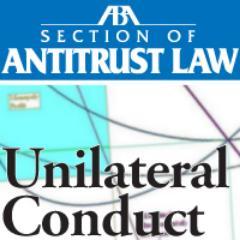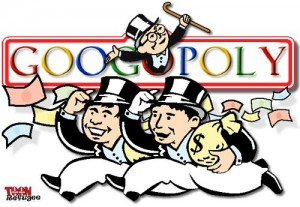This article was published by the ABA Antitrust Section’s Unilateral Conduct Committee in its Monopoly Matters journal for Spring 2013. (Reprinted with permission.)

The recently closed Federal Trade Commission (“FTC”) investigation of Google, Inc. for alleged monopolization[1] illustrates a truism of antitrust practice. The flexibility of antitrust law in adapting to new industries and modes of anticompetitive conduct is also a source of frustration, because the ex ante application of the domain’s broad principles to particular business practices is tricky to forecast without highly intensive, fact-specific analysis.
While a lot of ink was spilled following now-former Chairman Jon Leibowitz’s January 3, 2013 press conference, not much has attempted an analytical review of the merits. With the caveat that no outsider knows precisely what evidence the agency collected, this article tries to do just that. The lessons drawn are surprisingly unremarkable. Even in “new economy” industries, the tried-and-true elements of a monopolization claim remain crucial. Where unilateral conduct exhibits plausible efficiencies without serious evidence of competitive harm in a relevant market, it is impossible to make a viable case of monopoly maintenance under Section 2 of the Sherman Act (“Section 2”).
A. Market Definition
As every antitrust practitioner can recite, being a monopoly is not itself illegal, rather it is unlawful to obtain or maintain monopoly power by exclusionary or anticompetitive means in a relevant antitrust market. The existence of a putative “Internet search” market is thus a core proposition in any attack on Google for unlawful monopolization; the necessary premise is that Google’s high share — estimated to be anywhere between 65 to 80% — for Web searches is the foundation of an alleged monopoly.
Here the legal analysis begins to break down. Internet search is a free product for which consumers (Internet users) are charged nothing, with the service supported by advertising revenues. Since monopoly power is the power to control price or exclude competition, Google’s high “market share” may not in fact reflect any actual market power. More importantly, search users are like television viewers; they are an input into a different product, search advertising, in which consumers are effectively sold by virtue of advertising rates based largely on impressions and click-throughs. Just as NBC and ABC compete for television viewers in order to sell more advertising, so too do search engines monetize the service by selling Internet eyeballs to advertisers.[2]
Relevant market analysis must therefore focus on the area where Google in fact competes with other search engines, namely the sale of search advertising. There are two significant problems with a “search advertising” market. First, this market definition does nothing to advance the cause of complainants such as Yelp, Kayak and other so-called “vertical” competitors of Google’s non-search products, because they do not compete for search advertisers. Second, the relevant market cannot be so limited:
- Web search ads are good substitutes for display (e.g., banner) ads. Because advertisers pay for users who click through to their sites, both represent alternative ways to reach consumers. If Google raised prices for search ads,customers would switch more of their advertising dollars to display ads. And the Internet display ad segment is something in which Google has lagged well ll behind the leader, Facebook.
- Both search and display ads increasingly compete against mobile search ads. This rapidly growing segment is radically different, with searches designed to retrieve more targeted results and in which a near-majority of searches are performed within smartphone and tablet apps like OpenTable, FourSquare and others, bypassing traditional search engines.
- Advertising-supported Internet services increasingly compete with traditional media for revenues. Newspapers have lost huge swaths of advertising revenues — especially, though hardly just, classified ads to Craigslist, etc. — but are making money in digital advertising. Nearly 1/3 of the New York Times’ total revenue came from online ads as far back as 2010.[3]
Neither the Chairman’s press conference nor the FTC’s parallel opinion on standard-essential-patents reveal whether the Commission agreed search advertising is a relevant market. One point seems clear: whatever the FTC concluded in its 2007 Google-DoubleClick merger review,[4] there are precious little indicia today supporting either Internet search or search advertising as stand-alone product markets for Section 2 purposes. See, e.g., Peterson v. Google, Inc., 2007 U.S. DIST LEXIS 47920 (N.D. Cal. 2007) (no basis to distinguish search advertising from other Internet advertising in market definition). As the Commission cautioned in 2007, “accounting for the dynamic nature” of “the online advertising space … requires solid grounding in facts and the careful application of tested antitrust analysis.”[5]
B. Monopoly Power
This author has written elsewhere about The Fantasy Google Monopoly,[6] in which I observed that “the reality is that Google neither acts like nor is sheltered from competition like the monopolists of the past, something the company’s critics never claim because they just can’t.” The facts suggest that regardless of Google’s share in a properly defined market, Google does not enjoy market power.
No Bottleneck or “Gateway” Control. Ten years ago, when the FTC believed America Online had market power, the conclusion rested on the fact that a vertically integrated AOL controlled access to competing Internet content.[7] Much like the pre-divestiture Bell System, the concern was that AOL held a “bottleneck” through which consumers had to pass to reach rivals. Yet Google does not control the Internet’s physical network and is thus not a bottleneck. “Google, or any search engine, cannot be a gateway to the Internet.”[8]
No Power Over Price. Whether search ad rates are the price of search or alternatively the relevant antitrust market itself, they fail on the central criterion of control over price. Google’s search ads are priced via an auction system — the highest bidder for an advertising keyword buys at its winning bid price. Certainly, there are ways to game an auction to favor some bidders and exert indirect influence on price. But such a novel theory of auction pricing power was apparently not asserted in the FTC’s investigation of Google.
No Network Effects. Nothing symbolizes modern antitrust so much as an emphasis on “network effects.”[9] Network effects exist when the value of a product increases in proportion to the number of other users of the product, hence a name which originated in telephone antitrust cases. There is little to suggest there are significant network effects in search or search advertising. That Sears may buy some search ad keywords, for example, makes it only slightly more likely (and a consequence of retail competition, not Google) that Macy’s will purchase search ads.
No Entry Barriers. A monopoly in a market in which entry is unlimited cannot be sustained for long. It is difficult to make a serious case that there are substantial entry barriers in Internet search. Web page indexing, the key input, is a product of computing horsepower and storage capacity. Both are commodities with steadily falling prices, per Moore’s law, in today’s economy. That Facebook has recently launched its own search product[10] says it all: entry into search only requires investment capital, which the antitrust laws rightfully do not regard as an entry barrier.
“Data” Is Not a Search Entry Barrier. Proponents of a Google prosecution argued that the demographic data assembled from Web searches is a barrier to entry. Yet data about consumer preferences and behavior is also a commodity. Whether credit and commercial transaction data via the “big three” reporting agencies, consumer satisfaction data from J.C. Power or the emerging “big data” marketplace, data can easily be bought, in bulk, for cheap.[11] The corollary suggestion that economies of scale pose an insurmountable barrier to search entry represents an even more subtle concept which, unlike network effects, has not been recognized as a dispositive Section 2 factor — every large-scale business enjoys scale economies, after all.
C. Exclusionary Practices
The proponents of an FTC case obviously did not make a credible showing that Google’s search practices meet the requisite tests for exclusionary conduct — competition on a basis other than efficiency or the predatory sacrifice of short-term profits.[12] The failure was an analytical one, summed up with a Web ad running now, asking whether consumers can “trust” Google. Unfairness is a qualitative judgment that has nothing to do with current antitrust law. As the Supreme Court has written: “Even an act of pure malice by one business competitor against another does not, without more, state a claim under the federal antitrust laws; those laws do not create a federal law of unfair competition.”[13]
Search “Fairness” Is Not An Antitrust Obligation. The firms pushing for a prosecution contended that Google’s algorithms artificially lowered search results for specialized vertical rivals. Their theory that Web search has an inherent standard of fairness, something once called “search neutrality,” is epitomized by the name of the coalition that lobbied the FTC: FairSearch.org.
Dividing this issue into two parts, first consider whether such practices have an adverse effect on competition. Even if travel booking sites, for instance, compete with Google in search, there is no evidence that so-called link demotion diminishes their Web traffic. Some of these are the same companies that forecast Google would force them out of business but now boast of successful IPOs. Moreover, driving traffic to a website can easily be duplicated through other low-cost means, from email campaigns to QR codes.[14]
Second, consider whether there is a practical way to ferret out from Google’s constant tweaking of its algorithms which changes “demoted” quasi-search rivals. Since nearly everyone admits Google got to its present position by building a better search engine, the trade secret and IP consequences of such a monopolization theory are enforcement quicksand.
Most importantly, the changes Google makes to its search algorithms are designed to offer consumers a superior product. As Leibowitz summarized, “Google’s primary reason for changing the look and feel of its search results to highlight its own products was to improve the user experience.” [15] Where unilateral conduct exhibits such plausible efficiencies without evidence of substantial competitive harm, the exclusionary conduct element of a Section 2 case is not present.
Deception Without Much More Is Not Exclusionary. Former AAG Tom Barnett said in 2011 that the search firm acted anticompetitively because “Google’s display of search results is deceptive to users.”[16] Hardly. Although the Microsoft decision broke new legal ground in assessing when networks effects matter under Section 2, it did not create a “deception” prong of monopolization.[17] Lying may violate truth-in-advertising and consumer protection statutes, such as Section 5 of the FTC Act, but does not constitute anticompetitive conduct for Sherman Act purposes.
Use of Monopoly Power For “Leverage” Is Not Unlawful. A final problem with an FTC antitrust case was that it represented the discarded notion of monopoly leveraging. Vertical rivals like TripAdvisor and Kayak in reality compete with Google’s complementary content (e.g., Zagat and profiles) and sales (e.g., Google Checkout and ITA travel booking software) products. In other words, the claim is that Google uses its purported power in the search market to gain a competitive advantage in a second, different market. Of course, monopoly leveraging has been overruled as a stand-alone Section 2 violation.[18] Only if the competitive impact in the second market amounts to an attempt to monopolize is this sort of behavior illegal. It is impossible to conceive of an FTC complaint that could have credibly asserted there exists a “dangerous probability” Google would monopolize airline bookings, travel reviews or any other Internet content.
E. Durability
Consumer allegiance in technology is fleeting. The dramatically changed market positions of Myspace, Yahoo!, AOL and other, former online behemoths are the result of disruptive business models fueled by sweeping changes in underlying technology. No firm, including Google, is immune to such inflection points. With the accelerating substitution of apps, voice-response and social search (e.g., Apple’s Siri and Facebook’s Graph Search) — bolstered by evidence that in 2012, Google’s search advertising rates fell significantly for the first time[19] — there is little to suggest that any market power Google may hold exhibits the durability necessary for proof of monopoly power.[20]
F. Remedy
Chairman Leibowitz noted that the complainants had asked to “regulate the intricacies of Google’s search engine algorithm.”[21] The evident implication is one of institutional competence. Just as the Microsoft court articulated a policy of avoiding extension of per se rules like tying to volatile technology markets,[22] the FTC was obviously worried that delving into the innards of Google’s “secret sauce” could do more bad than good.
There is ample basis for caution. Witness, for instance, the 1982 AT&T consent decree, which most knowledgeable observers conclude transformed the Antitrust Division from a litigation agency into a de facto telecommunications regulator. While the FTC is better-positioned institutionally to act as regulator, it nonetheless shares the same antitrust policy bias favoring what the late Judge Harold Greene famously called the “surer, cleaner” remedy of divestiture.[23]
It is true that in vertical mergers, the enforcement agencies have more recently fashioned consent decrees which impose behavioral conditions. Yet the deferential judicial oversight of merger settlements “leaves the issue of remedies as one where the antitrust agencies possess considerable discretion.”[24] That ambiguity has led former enforcement officials to bemoan the departure from a “law enforcement” antitrust model in favor of a regulatory one where “antitrust counselors find themselves focusing, not just on whether conduct contemplated by their clients is illegal,” but on what agencies are likely to seek in the nature of remedies.[25]
The late Judge Robert Bork and Prof. Greg Sidak have observed that “a mandate that Google provide its competitors access to the top Google search positions through antitrust injunction or consent decree would be virtually impossible to enforce.”[26] There are no neutral or objective criteria on which to assess the appropriate listing order of search results; by its very nature, Internet search is an effort to predict the information users are looking to obtain. “Rankings” of Web sites are based on a myriad of factors (reciprocal links, hits, metadata, etc.) that is the role of search engines to interpolate. To wade into the morass of regulating the operations of Google’s algorithms would place the FTC in the untenable position of deciding, as a legal matter, the business merits of nearly every change to the highly automated delivery of search results. As the Court emphasized in Trinko, antitrust remedies are inappropriate if they require courts “to act as central planners, identifying the proper price, quantity and other terms of dealing — a role for which they are ill suited.”[27] That is surely a recipe for subjectivity and ultimately disaster.
Conclusion
Unlike in the EU, a Federal Trade Commission decision not to institute enforcement action does not result in a formal opinion. That hinders exploration of the antitrust analysis utilized by the agency in closing its two-year monopolization investigation of Google. Deconstructing that analysis with informed inferences nonetheless reveals that the FTC faced a daunting task in seeking to hold Google accountable under Section 2. The decision to fold-up its tent represents an admirable instance of prosecutorial restraint by an agency that had been very publicly hounded by Google’s rivals.
* Glenn Manishin was counsel to MCI in the AT&T antitrust case and served as a principal lawyer for ProComp (AOL, Oracle, Sun, etc.) and several software trade associations in the Microsoft monopolization case. Manishin does not represent Google.
[1] See Google Press Conference, Opening Remarks of FTC Chairman Jon Leibowitz, Jan. 3, 2013, http://ht.ly/ j0vWQ (“Leibowitz Remarks”); In re Motorola Mobility LLC, a limited liability company, and Google Inc., a corporation, FTC File No. 121 0120 (Jan. 3, 2013), http://ht.ly/j0jcm.
[17] 253 F. 3d 34, 84 (D.C. Cir. 2001) (en banc). Microsoft was held liable under Section 2 for deceiving Java developers that programs written with Microsoft’s Java tools would be OS-indifferent. In reality, the Microsoft interface created Windows-only Java apps that would not run on any other platform, thus reinforcing the Windows desktop monopoly. No one argues that Google has tricked advertisers or search users into utilizing Google products when they thought they were creating a Google-free computing environment.
 These results are foreign, literally, to U.S. jurisprudence. But they also illustrate a vitally important point. Legal regimes that have nothing to do with the Web are being applied in ways which upset existing services users take for granted and that threaten to impede future innovation. Linking is inherent in HTML and represents the essence of the Web. No one in America would argue seriously today that a hypertext URL link represents copyright violation. Search “autocomplete,” in turn, is not a creative activity, but a very useful technical advancement; it applies computer algorithms based on past searches to predict what the current user wants to see, speeding the retrieval of information from the Web.
These results are foreign, literally, to U.S. jurisprudence. But they also illustrate a vitally important point. Legal regimes that have nothing to do with the Web are being applied in ways which upset existing services users take for granted and that threaten to impede future innovation. Linking is inherent in HTML and represents the essence of the Web. No one in America would argue seriously today that a hypertext URL link represents copyright violation. Search “autocomplete,” in turn, is not a creative activity, but a very useful technical advancement; it applies computer algorithms based on past searches to predict what the current user wants to see, speeding the retrieval of information from the Web.



